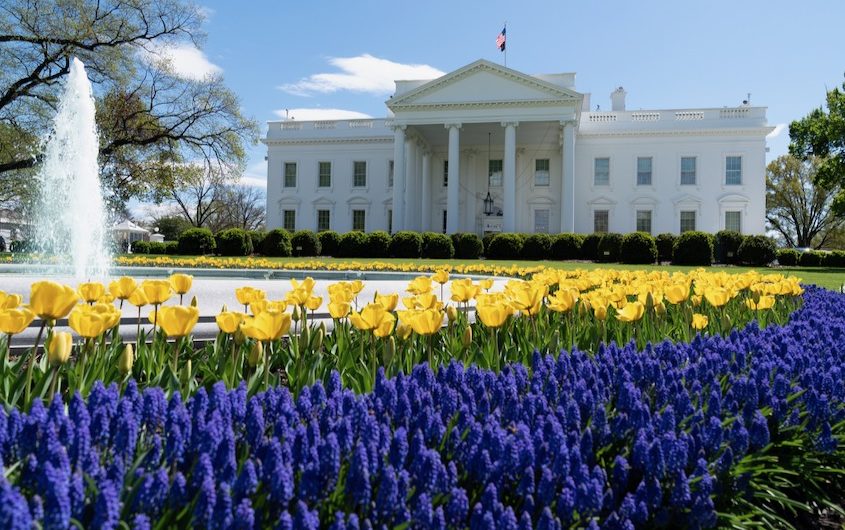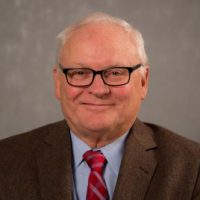
Official White House Photo by Andrea Hanks via Flickr
Enduring Partnership

Elizabeth Hotary
Communications Officer
Elizabeth Hotary is the Communications Officer at AICGS. She creates and implements communications strategies, coordinates publishing activities, and manages media relations. She contributes to AICGS research on workforce education and immigration and integration and has co-led AICGS study tours across the United States and Germany. Before joining AICGS, she taught English at a secondary school in Herne, Germany, as part of the Fulbright Program. During her time as a Fulbrighter, she also volunteered with the U.S. Consulate Düsseldorf’s MeetUS program, where she traveled to schools across North Rhine Westphalia to speak with secondary school students about the United States. She has previous experience at the University of Denver's Josef Korbel School’s Office of the Dean and WorldDenver, a nonprofit global affairs organization.
Ms. Hotary received her MA from the Josef Korbel School of International Studies at the University of Denver, where she was a Marc Nathanson Fellow. She graduated magna cum laude from the University of Arkansas with degrees in International Relations, European Studies, and German. She is an alumna of the Aspen Seminar for Young European Leaders "Next-Gen Europe: Leading for Values."
__

Eric Langenbacher
Senior Fellow; Director, Society, Culture & Politics Program
Dr. Eric Langenbacher is a Senior Fellow and Director of the Society, Culture & Politics Program at AICGS.
Dr. Langenbacher studied in Canada before completing his PhD in Georgetown University’s Government Department in 2002. His research interests include collective memory, political culture, and electoral politics in Germany and Europe. Recent publications include the edited volumes Twilight of the Merkel Era: Power and Politics in Germany after the 2017 Bundestag Election (2019), The Merkel Republic: The 2013 Bundestag Election and its Consequences (2015), Dynamics of Memory and Identity in Contemporary Europe (co-edited with Ruth Wittlinger and Bill Niven, 2013), Power and the Past: Collective Memory and International Relations (co-edited with Yossi Shain, 2010), and From the Bonn to the Berlin Republic: Germany at the Twentieth Anniversary of Unification (co-edited with Jeffrey J. Anderson, 2010). With David Conradt, he is also the author of The German Polity, 10th and 11th edition (2013, 2017).
Dr. Langenbacher remains affiliated with Georgetown University as Teaching Professor and Director of the Honors Program in the Department of Government. He has also taught at George Washington University, Washington College, The University of Navarre, and the Universidad Nacional de General San Martin in Buenos Aires, Argentina, and has given talks across the world. He was selected Faculty Member of the Year by the School of Foreign Service in 2009 and was awarded a Fulbright grant in 1999-2000 and the Hopper Memorial Fellowship at Georgetown in 2000-2001. Since 2005, he has also been Managing Editor of German Politics and Society, which is housed in Georgetown’s BMW Center for German and European Studies. Dr. Langenbacher has also planned and run dozens of short programs for groups from abroad, as well as for the U.S. Departments of State and Defense on a variety of topics pertaining to American and comparative politics, business, culture, and public policy.
__

Gale Mattox
Senior Fellow; Director, Foreign & Security Policy Program
Dr. Gale A. Mattox is Director of the Foreign & Security Policy Program at AICGS and a Professor in the Political Science Department at the U.S. Naval Academy. She is a former elected department chair and chair of chairs, and was awarded the Distinguished Fulbright-Dow Research Chair at the Roosevelt Center in the Netherlands 2009, Fulbright Scholar for NATO Strategic Studies in Brussels in Summer 2017, and Woodrow Wilson International Center for Scholars Fellow in 2016-17. Dr. Mattox served on the Policy Planning Staff of the Department of State, was a Council on Foreign Relations Fellow at the State Department Office of Strategic and Theater Nuclear Policy, and an International Affairs Analyst at the Congressional Research Service.
She has been a Bosch Fellow in Germany (also Founding President of the Bosch Alumni Association), NATO Research Fellow, and a Fulbright PhD Scholar. Dr. Mattox has held the offices of President (1996-2003) and Vice President of Women in International Security (WIIS); Adjunct Professor, Center for Peace and Security Studies at Georgetown University; and served as Vice President of the International Studies Association and co-chair of the ISA Women’s Caucus.
She has served on numerous boards, including the Tactical Advisory Council, Center for Naval Analysis, and the George Marshall Center Advisory Board in Germany; the advisory boards of St. Mary’s College Women’s Center, the Forum for Security Studies at the Swedish National Defense University, and WIIS. Dr. Mattox published Coalition Challenges in Afghanistan: The Politics of Alliance with S. Grenier, Enlarging NATO: The National Debates with A. Rachwald, and Evolving European Defense Policies with C. Kelleher. She is the co-editor of Germany in Transition, Germany at the Crossroads, and Germany Through American Eyes, and has published widely in scholarly journals. She holds numerous awards and has appeared on the Lehrer News Hour and other media outlets. She holds a PhD from the University of Virginia.
__

Jeff Rathke
President of AGI
Jeffrey Rathke is the President of the American Institute for Contemporary German Studies at the Johns Hopkins University in Washington, DC.
Prior to joining AICGS, Jeff was a senior fellow and deputy director of the Europe Program at CSIS, where his work focused on transatlantic relations and U.S. security and defense policy. Jeff joined CSIS in 2015 from the State Department, after a 24-year career as a Foreign Service Officer, dedicated primarily to U.S. relations with Europe. He was director of the State Department Press Office from 2014 to 2015, briefing the State Department press corps and managing the Department's engagement with U.S. print and electronic media. Jeff led the political section of the U.S. Embassy in Kuala Lumpur from 2011 to 2014. Prior to that, he was deputy chief of staff to the NATO Secretary General in Brussels. He also served in Berlin as minister-counselor for political affairs (2006–2009), his second tour of duty in Germany. His Washington assignments have included deputy director of the Office of European Security and Political Affairs and duty officer in the White House Situation Room and State Department Operations Center.
Mr. Rathke was a Weinberg Fellow at Princeton University (2003–2004), winning the Master’s in Public Policy Prize. He also served at U.S. Embassies in Dublin, Moscow, and Riga, which he helped open after the collapse of the Soviet Union. Mr. Rathke has been awarded national honors by Estonia, Latvia, and Lithuania, as well as several State Department awards. He holds an M.P.P. degree from Princeton University and B.A. and B.S. degrees from Cornell University. He speaks German, Russian, and Latvian.
__

Peter S. Rashish
Vice President; Director, Geoeconomics Program
Peter S. Rashish, who counts over 25 years of experience counseling corporations, think tanks, foundations, and international organizations on transatlantic trade and economic strategy, is Vice President and Director of the Geoeconomics Program at AICGS. He also writes The Wider Atlantic blog.
Mr. Rashish has served as Vice President for Europe and Eurasia at the U.S. Chamber of Commerce, where he spearheaded the Chamber’s advocacy ahead of the launch of the Transatlantic Trade and Investment Partnership. Previously, Mr. Rashish was a Senior Advisor for Europe at McLarty Associates, and has held positions as Executive Vice President of the European Institute, on the Paris-based staff of the International Energy Agency, and as a consultant to the World Bank, the German Marshall Fund of the United States, the Atlantic Council, the Bertelsmann Foundation, and the United Nations Conference on Trade and Development.
Mr. Rashish has testified on the euro zone and U.S.-European economic relations before the House Financial Services Subcommittee on International Monetary Policy and Trade and the House Foreign Affairs Subcommittee on Europe and Eurasia and has advised three U.S. presidential campaigns. He is a member of the Board of Directors of the Jean Monnet Institute in Paris and a Senior Advisor to the European Policy Centre in Brussels. His commentaries have been published in The New York Times, the Financial Times, The Wall Street Journal, Foreign Policy, and The National Interest, and he has appeared on PBS, CNBC, CNN, and NPR.
He earned a BA from Harvard College and an M.Phil. in international relations from Oxford University. He speaks French, German, Italian, and Spanish.
__

Stephen F. Szabo
Senior Fellow
Dr. Stephen F. Szabo is a Senior Fellow at AICGS, where he focuses on German foreign and security policies and the new German role in Europe and beyond. Until June 1, he was the Executive Director of the Transatlantic Academy, a Washington, DC, based forum for research and dialogue between scholars, policy experts, and authors from both sides of the Atlantic. Prior to joining the German Marshall Fund in 2007, Dr. Szabo was Interim Dean and Associate Dean for Academic Affairs and taught European Studies at The Paul H. Nitze School of Advanced International Studies, Johns Hopkins University. He served as Professor of National Security Affairs at the National War College, National Defense University (1982-1990). He received his PhD in Political Science from Georgetown University and has been a fellow with the Alexander von Humboldt Stiftung, the Woodrow Wilson International Center for Scholars, and the American Academy in Berlin, as well as serving as Research Director at AICGS. In addition to SAIS, he has taught at the Hertie School of Governance, Georgetown University, George Washington University, and the University of Virginia. He has published widely on European and German politics and foreign policies, including. The Successor Generation: International Perspectives of Postwar Europeans, The Diplomacy of German Unification, Parting Ways: The Crisis in the German-American Relationship, and Germany, Russia and the Rise of Geo-Economics.

Yixiang Xu
China Fellow; Program Officer, Geoeconomics
Yixiang Xu is the China Fellow and Program Officer, Geoeconomics at AGI, leading the Institute’s work on U.S. and German relations with China. He has written extensively on Sino-EU and Sino-German relations, transatlantic cooperation on China policy, Sino-U.S. great power competition, China's Belt-and-Road Initiative and its implications for Germany and the U.S., Chinese engagement in Central and Eastern Europe, foreign investment screening, EU and U.S. strategies for global infrastructure investment, 5G supply chain and infrastructure security, and the future of Artificial Intelligence. His written contributions have been published by institutes including The Chinese Academy of Social Sciences, The United States Institute of Peace, and The Asia Society's Center for U.S.-China Relations. He has spoken on China's role in transatlantic relations at various seminars and international conferences in China, Germany, and the U.S.
Mr. Xu received his MA in International Political Economy from The Josef Korbel School of International Studies at The University of Denver and his BA in Linguistics and Classics from The University of Pittsburgh. He is an alumnus of the Bucerius Summer School on Global Governance, the Global Bridges European-American Young Leaders Conference, and the Brussels Forum's Young Professionals Summit. Mr. Xu also studied in China, Germany, Israel, Italy, and the UK and speaks Mandarin Chinese, German, and Russian.
__
Recommendations to the Next U.S. Administration for the German-American Relationship
The United States and Germany have forged a unique partnership in the seventy-five years since the end of World War II, based on a commitment to democratic freedoms, strong and innovative economies, and a solemn pledge to defend one another. It is part of the most successful cooperative endeavor in modern history: the international architecture Washington created, enabling an unprecedented expansion of prosperity and liberty.
Even the best marriages are tested, however. The German-American relationship is undergoing perhaps the greatest stress test in its postwar history. This is a result in large part of the changes in policy and style by the Trump administration. But it also reflects the inescapable reality that the world is changing, and the U.S. and its allies like Germany must adapt, even while the principles on which we base our cooperation remain unwavering. Put simply, the United States, Germany, and Europe have no closer friends and no more productive partners than each other.
The dual nature of the U.S.-German relationship is at the heart of this publication: our partnership endures because of the shared interests, intricate ties, and common democratic institutions that unite us. At the same time, we have differences: the frictions that arise can make partnership a trial that we must endure. This requires the political readiness and skill to establish major priorities together and not to let minor irritants sidetrack us. It is our conviction that today, as throughout postwar history, the unifying forces are more powerful than any disagreements in comparison to the world we face together.
The coming five months likely will see one of the hardest-fought presidential campaigns of our lifetimes. President Donald Trump and former Vice President Joe Biden present diverging views of the problems our country faces and differing prescriptions for addressing them.
The Trump administration in three and a half years has stripped from the German-American relationship much of the nostalgia, but the removal of sentimentality only exposes more starkly the shared interests of the United States and its partners—including the advanced economies in Europe, and most especially Germany.
In this publication, AGI scholars and staff focus on the common interests that can form the basis of renewed transatlantic cooperation in the coming four years, regardless of election outcome. We do not weigh one candidate against another; instead, we identify constructive opportunities that either candidate could pursue. We do not attempt to predict what paths either candidate would take in office. A re-elected President Trump, for example, could decide to withdraw all U.S. forces from Germany or otherwise undermine NATO, as shortsighted as that would be. We seek to highlight the broad and promising scope that exists to strengthen U.S.-German collaboration within the approaches of either leader and his political party. Those opportunities for shared success are many:
- The United States has a formidable infrastructure of foreign policy coordination and security action. Jeff Rathke describes how to bolster this framework through active engagement, complemented by stronger legislative involvement in key issues.
- As the largest and most intense economic relationship on earth, the United States and Europe can forge a new approach to trade, as Peter Rashish argues. A “Safe Trade” agenda would advance U.S. prosperity and security along with our allies—an endeavor in which Germany could play a crucial role as the largest economy in Europe.
- Dr. Stephen Szabo explores Russia policy and the opportunities Berlin and Washington have to strengthen solidarity, stability, and peace in Europe for a further generation.
- Dr. Gale Mattox focuses on America’s most important alliance—NATO—and how Germany and the United States could reinforce shared purpose and shared burdens.
- Collaboration between the U.S. and Germany on China policy can anchor a strategic transatlantic approach, as Yixiang Xu writes, highlighting pragmatic ways to address technology and trade threats from China’s increasingly assertive policies.
- Federalism in the U.S. and Germany is under stress. Dr. Eric Langenbacher points out common challenges our societies and political systems must confront to achieve renewal.
- Elizabeth Caruth outlines how the bilateral partnership can improve U.S. labor market policy by building out the apprenticeship and workforce training models that have been at the heart of German investment in the United States.
Partnership, of course, takes two. Germany is in the midst of its own transition, with Chancellor Merkel’s announced retirement from politics after the 2021 Bundestag election and the impending leadership change in her Christian Democratic Union. That election will result in a new chancellor and possibly a different governing coalition. Germany thus is embarking on a more dynamic period with the potential for significant changes in policy and approach.
We offer these recommendations in the conviction that the United States and Germany have enormous opportunities together. We hope that these ideas meet with bipartisan support that advances bilateral relations, strengthens trust, and shapes a favorable international order.
We can’t do it alone.
Support for this publication was generously provided by The German Marshall Fund of the United States.








